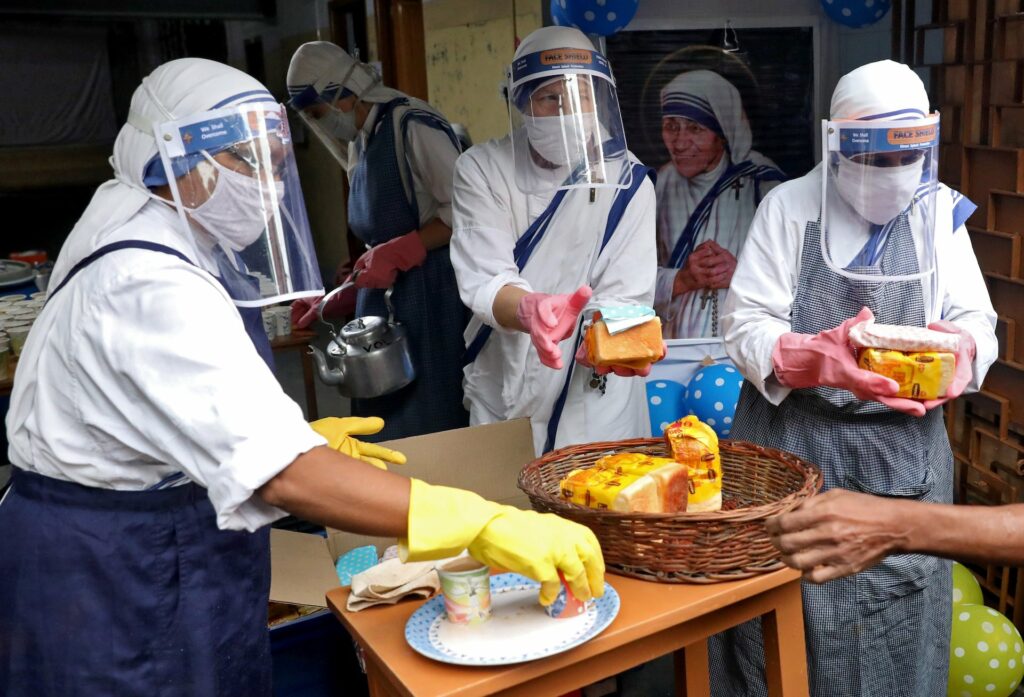Among the myriad changes COVID-19 has brought, perhaps one of the most difficult has been the effect on our ministries. Many of the ways we traditionally served in our parishes are no longer possible, which may leave us wondering how we can stay connected to our parishes, evangelize and serve others.
Though our ministries — and our availability — may look different right now, there are still ways to meaningfully serve.
If you’re not too Zoomed-out, many parishes are operating ministries online. Religious education and RCIA classes, rosary groups and even choir practices have been transferred to virtual environments to allow for safe gathering.
If you’d rather not look at another screen, consider regularly taking time to check in and pray with friends or family over the phone. My friends Marian and Alicia pray a daily rosary together, and not only has this activity strengthened their friendship, it’s also served as a consistent reminder that someone cares for them.
Though the corporal works of mercy are harder to carry out in our current circumstances, different ministries are finding creative ways to be physically and safely present.
My friend Anna is in a mother’s group that supported her after her recent birth by dropping off meals and checking in on her. Since the vulnerable in our communities are even more vulnerable during times of crisis, some parishes are safely operating food pantries, where parishioners can donate their time, food or money.
For those of us still mostly at home, there’s comfort in St. Teresa of Kolkata’s words: “Love begins at home.” Our ministries may shift to serve those we live with. I was a lector pre-COVID, and though I’m not longer able to perform this ministry on Sundays, I’ve used my gifts to read aloud to my roommates from a spiritual book.
As a single person, I’ve also felt called to the ministry of better tending to my friendships. During this time of physical distance, I’ve been more intentional about seeking out community with friends for activities we can do virtually, like sipping tea, catching up and playing games.
For those who feel called to serve close to home, consider the needs of your neighbors. Project Finding Calcutta, a ministry that promotes service to the poor and vulnerable we encounter in our own communities, recommended early on in the COVID-19 crisis that each person engage in “Five Knocks” on the doors of neighbors as a way to both better know and minister to their needs.
Another way to tend to the sick, the elderly, the imprisoned or those going through a hard time is to write letters. My friend Sarah made this her ministry during the early months of COVID-19, creating hand-stitched cards to comfort friends in their loneliness.
As I continue to discern my call to ministry in the midst of pandemic, I’m struck by St. Therese’s declaration, “My vocation is love!” In entering a cloistered order, Therese, in a sense, chose a perpetual quarantined lifestyle. And yet, she desired to be all for Christ, including a missionary the world over.
Within the confines of the convent grounds, she found her vocation of love often manifested in bearing small annoyances with joy. Juxtapose this way of living out vocation with Mother Teresa’s Missionaries of Charity, who, throughout the pandemic, have continued carrying out their own particular vocation of love — to serve the poor and the sick.
The beauty of being Catholic is its variety. Therese’s declaration that “I can offer God only very little things” is perhaps truer now than ever before. Whether you’re called to be active or contemplative in your current ministry, do not be afraid to ask God to open you to new ways of serving your brothers and sisters. The call to love can be carried out in all circumstances.
Lindsey Weishar is a poet and freelance writer from the Diocese of Peoria.

